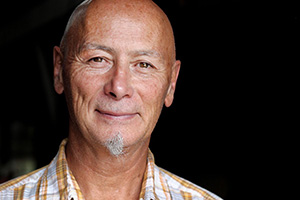Canadian Theatre Encyclopedia
Durand, Yves Sioui

Playwright, director, actor, filmmaker, a pioneer of contemporary First Nations Theatre. Yves Sioui Durand was born near Quebec city in 1951, and is a member of the Wendake Huron-Wendat Nation.
In 1985, Durand co-founded Les Productions Ondinnok with Catherine Joncas and John Blondin, Quebec’s first French-language Indigenous theatre company. From 1995-98, with his partner, Catherine Joncas, he travelled to remote communities with the Theatre of Healing project. Ondinnok produces works by emerging Aboriginal artists, and participates in the artistic development of its community. It ran an intensive Aboriginal theatre training program from 2002 to 2010.
Durand has written fifteen plays for Radio-Canada and ten works for the stage which have been widely performed in Canada, Mexico and Europe (Intercity Festival, Florence; International Festival of Contemporary Theatre, Lausanne; Nottingham and Glastonbury Festivals; Montpellier Danse and Nancy Festivals).
He has also directed twenty-eight productions, including Xajoj Tun Rabinal Achi, a Mayan text from the Spanish conquest of Guatemala in 1547. His performance theatre is based on Pan-American Indigenous mythologies, enacted through dance, music, and imagery more than text. In his epic outdoor spectacle, Le porteur des peines du monde (The Sun Raiser), the sun carries the suffering of humanity from East to West until purified through darkness and reborn at dawn. It was performed in English at the Banff Centre for the Arts in 1995.
La Conquête de Mexico (Montréal, 1991) is based on Bernardino de Sahagun's Historia General de Las Cosas de La Nueva España (1527-1580). The dramatic structure is derived from the Aztec calendar, and ranges between past and present, with text in French, Aztec and Spanish. UKUAMAQ (Montréal, 1993) is based on an Inuit legend. ATISKENANDAHATE, Voyage to the Land of the Dead (Montréal, 1988; CBC-TV, 1991; CBC radio, 1994) is a contemporary interpretation of the Orpheus myth. More recent works include Iwouskéa et Tawiskaron (1999) and Kmukamch l'Asierindien (2002). A World that Comes to an End – Lola addresses the genocide of the Indigenous people of Tierra del Fuego and the racist themes that underlie violence against women.
In 2010, Durand directed Mesnak, Quebec’s first Indigenous feature-length film in French, which has been screened at festivals in Canada, the US and Europe, winning awards for best film and best direction at the Santa Fe and San Francisco film festivals. Since 2013, he has been directing Le printemps autochtone d’art, a biennial, multidisciplinary cultural event.
His many awards include the Festival TransAmeriques Americanite Award and a Governor General’s Award for Lifetime Achievement (2017).
In 2004, he partnered with the National Theatre School of Canada to develop Quebec’s first Indigenous theatre training program.
For Durand, the theatre artist is a “living bridge” between traditions constructed through archaic ritual. His theatre seeks “to provide access to the imaginary land of [his] people, which was obscured but persists in [them]. It is for white, and for Aboriginal audiences, who often have lost touch with their past” (Ondinnok website).
Sources: Brad Wheeler. “A Snapshot of three Governor-General’s Award laureates”, Globe and Mail 24 June 2017: R1.
Renata Usmiani. www.thecanadianencyclopedia.ca
http://ggpaa.ca/award-recipients/2017/sioui-durand,-yves.aspx
Last updated 2019-10-18

